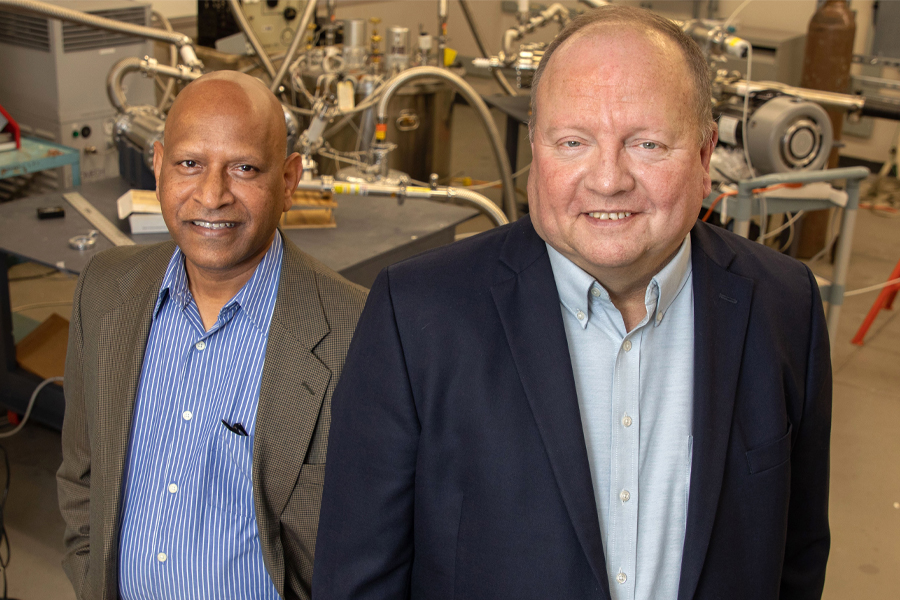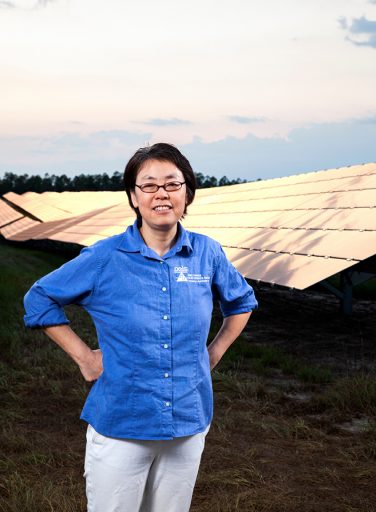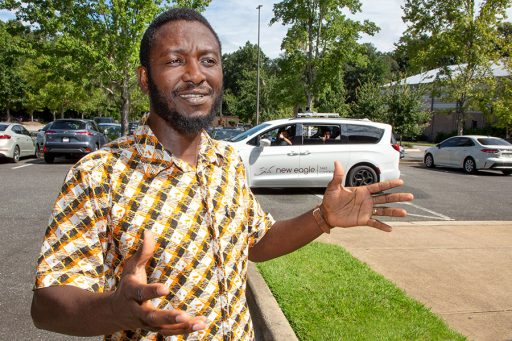
When Roger McGinnis was an officer serving on U.S. Navy ships, a problem with the onboard electrical system typically meant enduring a power outage that could last up to several hours.
Now, as a director of Florida State University’s Center for Advanced Power Systems, or CAPS, McGinnis oversees an entity dedicated to finding solutions that would instantly resolve those problems.
That’s just one example of work underway at CAPS, a multidisciplinary research center established in 2000. Researchers there are developing improvements for electric power systems modeling and simulation, power electronics and machines, control systems, cybersecurity for power systems, superconducting power devices and more.
“CAPS takes on big challenges in the fields of several power and energy engineering areas, with a large investment in power systems technology,” McGinnis said. “The work happening here is helping Florida and the nation meet current and future energy needs in a variety of ways.”
The research center has been at the forefront of all-electric ship technology for the U.S. Navy, in which the ship would use an integrated power source for propulsion, weapon systems, computer systems and other electric components. In 2016, CAPS received a $35 million grant from the Office of Naval Research for electric ship research. In 2021, the center earned a $31 million contract from Naval Sea Systems Command to develop onboard electrical power and energy systems as well as a $30 million, five-year grant to continue leading the Electric Research and Development Consortium.
The Navy also named the center as an accredited test site for power equipment, the first such test site at a university facility.
“The trust placed in CAPS faculty is a testament to their research abilities,” McGinnis said. “The researchers here solve complex, multiyear engineering problems that are of vital importance to the country.”
The military is not the only entity coming to CAPS to help find solutions to their research questions. The center also has several industry partners sponsoring research projects.
CAPS has worked with large companies such as Mitsubishi Heavy Industries, General Electric, General Dynamics, Curtiss-Wright, Eaton, ABB, TECO-Westinghouse and Google. Researchers at the center also have excellent relationships with small businesses such as Hepburn & Sons, IREUS Technologies and others through initiatives such as Small Business Innovation Research and Small Business Technology Transfer programs.
Businesses often have great ideas but lack the facilities or specialized knowledge to develop or test prototypes. CAPS researchers have frequently helped fill that gap.
CAPS Associate Director Sastry Pamidi has worked with Colorado-based Advanced Conductor Technologies to develop a ready-to-use superconducting cable system. The work has been funded by SBIR grants that encourage businesses to partner with universities to conduct high-level research and product development.
The sponsored research projects cement the relationships between CAPS and industry, but they also provide a learning environment for the next generation of engineers. Work on research projects sponsored by technology companies gives students opportunities to apply knowledge learned in the classroom and to connect with business leaders who see them in action. The work at CAPS often involves advanced engineering tools that students wouldn’t otherwise have opportunities to explore.
CAPS typically is the workplace for 50 graduate students from the FAMU-FSU College of Engineering and 30 undergraduates each year.
“It’s a win-win situation,” said Pamidi, who is also the chair of the Department of Electrical and Computer Engineering at the FAMU-FSU College of Engineering. “Companies need help, and we have the expertise to help them while training the future workforce.”
This future workforce is trained by 10 tenure-line faculty members of the FAMU-FSU College of Engineering and 25 full-time researchers, many of whom also hold appointments at the college. They handle a vast number of projects that span the field of power engineering.
Here are a few examples of current CAPS projects:
Lowering the risks for new electronic hardware
You never quite know what you will encounter when adding a new component to a complicated power system, said CAPS senior research faculty member Michael “Mischa” Steurer.
“We often see unexpected outcomes when we test prototypes,” he said. “Our goal is to make sure those unexpected outcomes don’t lead to problems.”
Steurer and his team helped pioneer a tool that allows engineers to build a simulation of complicated power systems. They can then add to that simulation the real-life component they want to incorporate in the system and see how everything reacts. This “hardware-in-the-loop” simulation technique lets engineers test new equipment much earlier in the design process, before building the rest of the system or tearing out the guts of an existing one. That reduces costs and risks associated with integrating new technology into the electric power grids of the future.
Power and energy systems need to become more agile to handle new and emerging applications, such as microgrids that use renewable energy or electric cars, ships and airplanes, where power loads can change rapidly, Steurer said.
“Power systems have to become better at handling dynamic loads,” he said. “A microgrid that gets energy from solar power, for example, will have to handle weather that can change from moment to moment. We’re helping design and test the systems to meet those needs.”
Developing superconducting power devices to move energy more efficiently
Typical electric cables, which often use copper or aluminum to conduct current, lose energy because of electrical resistance. That is not the case with superconductors.
These engineering marvels show no resistance to electrical current and offer improvements in applications such as electric machines, quantum computers and more.
Pamidi’s research group develops superconducting power systems, including in applications such as electric planes and ships.
The benefits of an electric plane go beyond adding another option for powering aircraft. Superconducting devices would allow for lighter and more efficient aircraft, opening a host of possibilities for sustainable travel with minimal environmental impacts.
Planes using electricity would not have the emissions and noise that conventional planes generate, burdens that mostly fall on the neighborhoods around airports. Because they could accelerate quickly, planes using electricity could use shorter runways for landing and take-off, expanding where they could operate.
Superconductors could help develop all-electric ships. An important consideration for ships is how far they can travel before needing to refuel. Electric ships can expand that range dramatically.
“Electric propulsion gives ships or planes improved capabilities, but we need to develop the technology to make those systems work at scale,” Pamidi said. “Superconducting cables make it possible to move large amounts of electricity between the sources and loads without taking up too much space or becoming too heavy.”
Modernizing the electric grid

America’s electric grid is evolving to handle more energy from renewable sources such as solar and wind, but these sources can’t be turned on at a moment’s notice.
Professor Helen Li is helping with that transition, courtesy of a $3.8 million grant from the Department of Energy’s Solar Energy Technologies Office and a $1.8 million investment from FSU and other partners. Working with colleagues from the City of Tallahassee, Northeastern University, the National Renewable Energy Laboratory and Siemens, researchers are developing technology that could help make renewable energy solutions more feasible, and thus increase their adoption. The team is developing converters that are smaller and lighter than existing technology and can function at a higher voltage, which is crucial for use in the power grid.
They also give grids the ability to quickly and reliably switch between a connection within the wider electric system and a self-contained system. A so-called “microgrid” allows cities to be more resilient to disruptions in an outside power supply. In the case of a hurricane that downs power lines, for instance, the microgrid could supply power when the larger grid is down.
The controls developed by Li and her team incorporate artificial intelligence, which helps power plant managers efficiently use the energy captured by renewable sources. For example, AI can tell managers whether energy from solar panels should be used immediately or stored for later use, when the sun is down or wind isn’t blowing. The algorithm driving that decision will consider how much energy users need and when it makes financial sense to sell it back to the grid. It also considers how to use storage devices, such as batteries, so they last longer.
It’s all part of making a grid that’s more adaptable and sustainable.
“The electric grids of the future will need to be designed to handle more renewable energy sources,” Li said. “The work we’re doing at CAPS is helping that transition.”
Improving autonomous vehicle technology
Humans make mistakes. Human drivers make plenty of them. Autonomous vehicle technology is a tool that could help drivers reduce the likelihood and impact of errors.
Assistant Professor Olugbenga Moses Anubi is helping develop the next generation of autonomous vehicle technology.

There’s a range of driverless technology. Some of it, such as lane assistance or automatic braking, is standard in new cars. Other technologies, such as a fully autonomous car, are still being developed. The work also leads to improvements for things like power systems or pipelines.
In Anubi’s Resilient and Autonomous Systems Lab, researchers develop algorithms that autonomous systems can use to navigate a complex environment. Those algorithms are deterministic, meaning that particular inputs will lead to the same decision every time. Researchers simulate scenarios over and over when building those algorithms, giving them a better chance of catching accidents before they happen.
“In our lab, we don’t see a future where all vehicles on the road are going to be fully autonomous,” Anubi said. “People are still going to ride bicycles, right? Those are not going to be autonomous. There are going to be all kinds of vehicles on the road. We’re not taking humans out of the loop. We’re doing autonomy with humans, not autonomy in spite of humans.”



